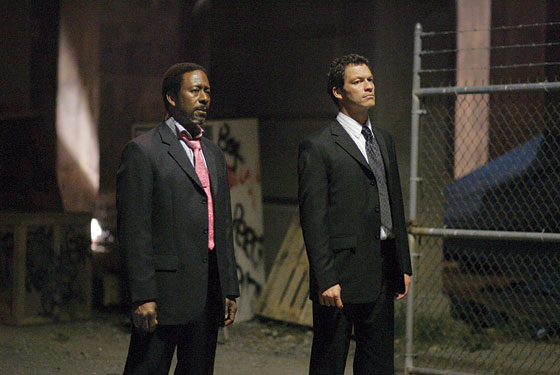
Forty or so minutes into the seventh hour of the fifth and final season of The Wire, who should walk into a tavern for a sit-down with a source but an agitated Clark Johnson? And who should be stuck at the end of the bar with nothing to say and less to do but a cadaverous Richard Belzer? This is an inside joke. Johnson has a major role to play in the last ten episodes of The Wire, as Augustus “Gus” Haynes, the city editor of the Baltimore Sun. Belzer, on temporary loan from Law & Order: SVU, is merely a sight gag. But the Hitchcockian cameo asks us to remember that once upon a time Johnson and Belzer were fellow cops on Homicide: Life on the Street, the Baltimore police procedural where the creator and producer of The Wire, David Simon, got his TV start. After Homicide, after The Corner, as The Wire winds down, Simon seems to be saying a long good-bye to Chesapeake Bay—and who better to bear valedictory witness than Belzer, the original crab cake?
Besides, even a series as distinguished as The Wire—“broadcast literature,” it has been called; Balzac and Dickens have both been mentioned by the critics; Zola, Gogol, James Ellroy, and Chester Himes should have been—doesn’t invent itself from scratch. It comes with some recombinant DNA, a double helix of antecedents. The Wire incorporates gene splices and fossil traces not only of previous TV shows featuring cops hunkered down inside an inner-city bunker (like Homicide, which would have been unimaginable without Hill Street Blues, which itself derived from the Police Story anthology series inspired by Joseph Wambaugh’s L.A. novels), but also Miami Vice (with its bruise-colored fade from cop to crook) and EZ Streets (with its gothic politics of urban hell). To say this is in no way to disrespect The Wire’s achievement as a prodigal, open-ended narrative about race war, class hate, and institutional malfeasance in a broken city, with almost as many characters as War and Peace (even if their names are Bodie, Poot, Snoop, and Wee-Bey). It’s just to suggest that there was intelligent television before The Wire, from The Defenders to M*A*S*H to Frank’s Place to The West Wing, and there will be intelligent television after it, if the writers’ strike is ever settled. What makes The Wire feel so different after 50 grueling episodes is that it’s all about failure. It leaves us heartsick.
And now for that final season: Once more, we must dance around plot points. Once again, The Wire opens up new terrain, only to bury more bodies. In its second season, we were suddenly precipitated from the back rooms of bought politicians and the mean streets of narco-traffic to the degradations of the Baltimore docks, where longshoremen had just discovered that drug-running was a more reliable source of economic security than belonging to an impotent union. In an equally surprising fourth season, the producers went so far as to more or less sideline their heroic rogue cop, Jimmy McNulty (Dominic West), in order to spend quality time in a West Baltimore middle school finding out what the reality principle would do to four frightened eighth-graders. In these last innings, as The Wire ties up its gnarled threads, it also makes its most daring departure yet, introducing yet another institution, and a brand-new cast of characters to disappoint us.
Not that our favorites have vanished. Yes, McNulty will once again leave the reservation. No, “Bunk” Moreland (Wendell Pierce) won’t go with him. Carcetti (Aidan Gillen), the new “weak-ass mayor of a broke-ass city,” sounds more and more like Bobby Kennedy and behaves more and more like Max Headroom. Bubbles (Andre Royo) quits heroin, attends 12-step meetings, and takes on the sickly glow of a Russian Orthodox icon. Marlo (Jamie Hector), the sociopathic Julien Sorel in this chronicle of upward mobility, will make the mistake of infuriating Omar (Michael K. Williams), the gay assassin. There are reckonings, of a sort, for both Police Commissioner Burrell (Frankie R. Faison) and State Senator Davis (Isiah Whitlock Jr.), but I’ve decided not to tell you what happens to Proposition Joe (Robert F. Chew). Perhaps the only one of these people we’d want to meet outside the office is Detective Shakima Greggs (Sonja Sohn), and even she is weary unto desolation.
But they are each of them caught up and shuttled back and forth in a pincer movement of fabrications and bad faith, a counterpoint of tradecrafts—from the usual power politics, corrupt police work, and Balkan blood feuds on the wasteland streets to something completely different: the color-coded, computer-cooled, and white-noisy newsroom of the Baltimore Sun. The newspaper is at the very heart of the information-commodities racket, with an old-fashioned city editor (Clark Johnson), hungry young reporters (Michelle Paress and Tom McCarthy), an absentee ownership (off in cost-cutting, layoff-loving Chicago), and all the modern conveniences (especially a lack of scruple). Maybe a corrupt city deserves corrupt journalism. All the wiretaps and telephoto surveillance, so many pager clones, and still nobody knows anything real. It is as if, in a guilty fever, we dreamt up our own worst punishments—stories of the sort Joan Didion used to tell us about the princess caged in the consulate and the man with the candy leading the children into the sea.
Veteran watchers of The Wire know that the series takes its time. The final season will seem even longer, as all of the characters are obliged to contemplate, if not the faces they’ve grown in the mirror and the habits that hide in their dark, at least the corners they can’t get out of. No prisoners will be taken, not even the sainted Sage of Baltimore: “Fuck Henry Mencken!” we are told. And damned if they don’t.
The Wire
HBO. Sundays at 9 p.m. Starting January 6.